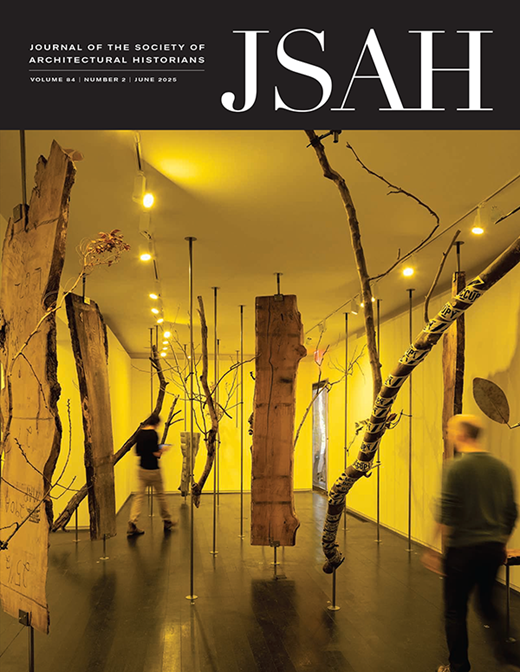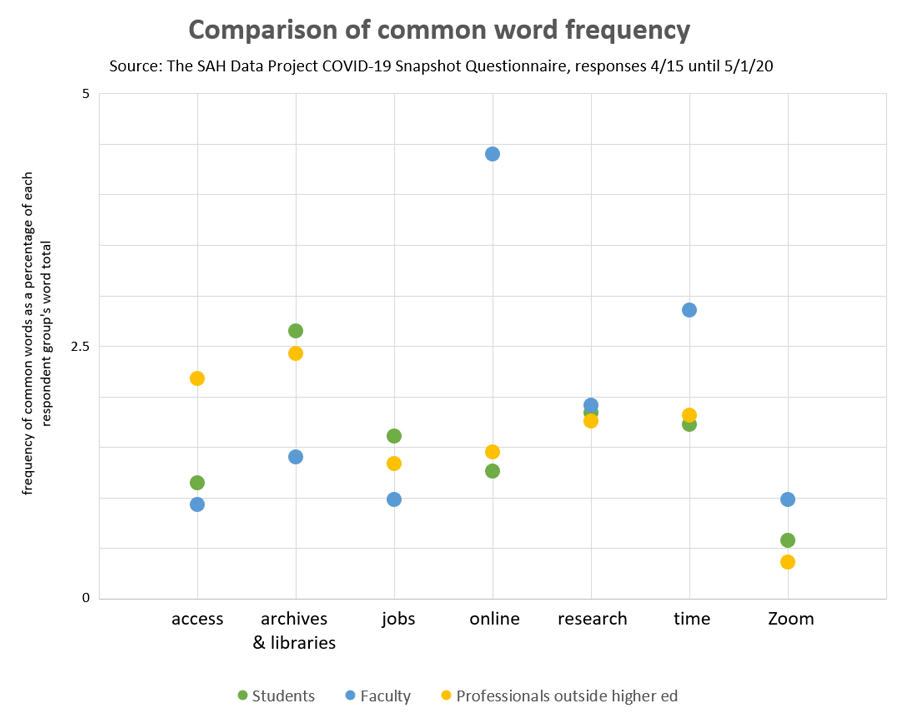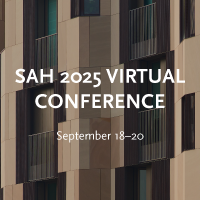-
Membership
Membership
Anyone with an interest in the history of the built environment is welcome to join the Society of Architectural Historians -
Conferences
Conferences
SAH Annual International Conferences bring members together for scholarly exchange and networking -
Publications
Publications
Through print and digital publications, SAH documents the history of the built environment and disseminates scholarshipLatest Issue:

-
Programs
Programs
SAH promotes meaningful engagement with the history of the built environment through its programsMember Programs
-
Jobs & Opportunities
Jobs & Opportunities
SAH provides resources, fellowships, and grants to help further your career and professional life -
Support
Support
We invite you to support the educational mission of SAH by making a gift, becoming a member, or volunteering -
About
About
SAH promotes the study, interpretation, and conservation of the built environment worldwide for the benefit of all
Early excerpts from the SAH Data Project’s COVID-19 Snapshot Questionnaire
Last month the SAH Data Project started circulating our COVID-19 Snapshot Questionnaire, a brief set of questions about how people who study, work, and volunteer in architectural history around the world are experiencing the coronavirus pandemic right now. The idea was to give you a chance to contribute to the project in a way that might also help you cope—and hundreds of you responded to that call.
There was so much demand in the first hours that, in fact, the questionnaire platform itself briefly crashed. The problem was resolved a short time later so if you tried and failed to access the questionnaire during that period, feel free to try again now.
Meanwhile, to honor your level of engagement in this initiative, we’ve decided to share a few representative excerpts a full month earlier than originally planned. So here, for the first time, are some of the things you’ve been telling us about the challenges, anxieties, and support you’ve experienced during this extraordinarily difficult time.
We’re leaving the questionnaire open until May 27, so don’t worry if you haven’t had the time or ability to contribute yet. We welcome you when you are ready. Thank you and be well.

This scatter chart indicates the relative frequency of common words across the three groups of respondents that completed the SAH Data Project’s COVID-19 Snapshot Questionnaire most often during the initiative’s first few weeks. Students led references to archives/libraries and jobs, faculty overwhelmingly referenced time and being online, and non-higher ed professionals referenced access to archives and sites by a clear margin. Research was referenced with virtually the same frequency by everyone.
STUDENTS
5. What is the biggest challenge you're facing in your architectural history-related studies right now?
I will no longer be able to do my preliminary dissertation research this summer, so I will be behind when I go to being working on the dissertation this coming year. This will put me almost a year behind where I would be.
— PhD student in the U.S.
6. Please describe at least one action that a person, organization, and/or institution could take that would help you with the challenge you described in question 5 above.
Possibility to visit the archive alone, on a fixed scheduled time.
— Master’s student outside the U.S.
7. Please describe at least one action that a person, organization, and/or institution has taken that has reduced the pandemic's impact on your architectural history-related studies.
My institution luckily has encouraged long distance learning and enabled us to have remote access to specific software that we do not have at home.
— Bachelor’s student in the U.S.
8. In what ways has the COVID-19 pandemic already disrupted or otherwise affected your life? And how do you expect this crisis to alter the direction of your life going forward?
My research has come to a halt, completely. I am a PhD candidate writing my first chapter and I feel despondent about the possibility of finishing. I can't travel to my sites and archives, and due to their geopolitical locations, I don't know when I will ever be able to return. My university has not extended any funding or delayed any requirements for graduate students, despite offering such life boats for faculty. At the same time that I am worried about being hospitalized…I also have to worry about what might happen if I can't make my chapter deadline. These things are utterly incongruent and should not be given equal measure in my mental space. But they are. Fellowships and grants are few and far between, and the process of fellowship cycles is one that is already unkind to mental health. At times, I think I may just give up if some break doesn't come through.
— Ph.D. student in the U.S.
This public health crisis has made me think carefully about what work will be most important going forward. Studying the built environment can give us important information about how and why we use space the way we do, and how it informs and informed by larger cultural shifts. But in this moment, it is perhaps most important to make things as easy as we can for everyone—make sure that everyone has a place to be that is safe and comfortable, thinking through the ways that we can make public space as it exists better able to facilitate interaction while social distancing, finding historical examples of these things that can help inspire action and hope for our own future. Moving forward, I'm concerned about my ability to find work that will provide material stability, and am reconciling myself with remaining in unstable conditions. As a working class person, this isn't new for me, but I was certainly hoping that an advanced degree would ameliorate the situation. In the long term, I'm sure it will. In the short term, I'm just hoping to do some good.
— Master’s student in the U.S.
FACULTY
5. What is the biggest challenge you're facing in your architectural history-related studies right now?
It's hard not to have feedback from student body language. And they're all overwhelmed.
— Full-time contingent/postdoc/VAP with contract of more than one year, outside the U.S.
6. Please describe at least one action that a person, organization, and/or institution could take that would help you with the challenge you described in question 5 above.
If we move forward to actual online courses (as opposed to remote teaching), having a platform for sharing best practices would be great.
— Professor in the U.S.
7. Please describe at least one action that a person, organization, and/or institution has taken that has reduced the pandemic's impact on your architectural history-related studies.
Hats off to the undergraduate students I am teaching this semester. They've been very supportive and often write in "thank you" into the chat at the end... something they never did in class.
— Associate Professor in the U.S.
8. In what ways has the COVID-19 pandemic already disrupted or otherwise affected your life? And how do you expect this crisis to alter the direction of your life going forward?
There has been a complete collapse of a healthy work/life balance as emails and Zoom calls have completely dominated my calendar. My own academic research has become severely limited because of having to pivot mid semester to offer my classes online, and for the amount of time we are now expected to engage with students. Some within the University administration feel that since faculty are no longer holding classes in person, we suddenly have additional time to take on other projects, including as acting as a psychological counselor to our students, a position that none of us are professional trained.
— Assistant Professor outside the U.S.
Our university relies on tuition numbers to exist. If we see a dip in enrollment faculty with my type of contract (adjunct with an annual contract) will be the hardest hit. I could come out of this pandemic without a job. They will continue to need class-to-class adjunct because they're super cheap and easily disposable. FT faculty will protect themselves and their jobs. But those of us who do the equivalent of FT work for 1/3 of the pay (calculated by the number of units taught and administrative duties) will be the hardest hit.
— Part-time contingent/adjunct in the U.S.
DEPARTMENT CHAIRS/PROGRAM ADMINISTRATORS
5. What is the biggest challenge you're facing in your architectural history-related studies right now?
The biggest challenge has been in the Historic Preservation curriculum and in courses with Digital Humanities content, which we run more as hand's-on workshops than as typical lectures or seminars focused on shared readings.
— Chair/administrator in historic preservation in the U.S.
6. Please describe at least one action that a person, organization, and/or institution could take that would help you with the challenge you described in question 5 above.
Capsule information about different digital tools/platforms by fellow historians who have used them would be helpful. It's hard to know where to start when you have not taught online before and have to do it all of a sudden.
— Chair/administrator in a professional design program in the U.S.
7. Please describe at least one action that a person, organization, and/or institution has taken that has reduced the pandemic's impact on your architectural history-related studies.
The university offers online teaching training and has extended deadlines for graduate students
— Chair/administrator in art history in the U.S.
8. In what ways has the COVID-19 pandemic already disrupted or otherwise affected your life? And how do you expect this crisis to alter the direction of your life going forward?
After the initial crisis management phase of the situation, I see my institution now entering the financial panic moment, when one of the most pressing issues I am currently grappling with is the desire to embrace seemingly easy solutions that threaten to disrupt or entirely halt critical efforts towards creating a more equitable, diverse, and inclusive educational environment, despite the fact that the pandemic has revealed just how deep these inequities are across institutions of higher education at all levels. I envision multiple challenges moving forward, among them a rapid escalation and exacerbation of austerity measures, bottom-line thinking, rapid expansion of online education, and other measures taken to try to generate tuition dollars without any regard for pedagogical, educational, or intellectual values. I can already see the ways in which there is a move to use COVID-19 as an excuse to implement previously unpopular ideas, whether it is in the sudden drive to expand online teaching far beyond the necessary response of this semester and the coming academic year, or in the move to make the most vulnerable among us—especially on the staff side and on the side of adjunct and general faculty (lecturers with long-term employment in my institution)—work even harder in less stable and secure positions.
— Chair/administrator in historic preservation in the U.S.
PROFESSIONALS IN AN ARCHITECTURAL HISTORY FIELD OUTSIDE OF HIGHER EDUCATION
5. What is the biggest challenge you're facing in your architectural history-related studies right now?
Completing onsite fieldwork and photography and research at libraries and other repositories. Not everything is online.
— Historic preservation independent scholar/consultant in the U.S.
6. Please describe at least one action that a person, organization, and/or institution could take that would help you with the challenge you described in question 5 above.
Increased digital access to research archives
— Independent scholar/consultant in historic preservation in the U.S.
7. Please describe at least one action that a person, organization, and/or institution has taken that has reduced the pandemic's impact on your architectural history-related studies.
Some sites working out ways of reducing the number of trades on site so that social distancing can be observed but work can go on.
— Design professional in historic preservation and museums/historical societies/curatorial, outside the U.S.
8. In what ways has the COVID-19 pandemic already disrupted or otherwise affected your life? And how do you expect this crisis to alter the direction of your life going forward?
My work also includes managing schedules and budgets for the museum's exhibitions, and we have had to scramble to rearrange several of our own exhibitions both in-house and traveling at the moment. With so much uncertainty, this is still not clear, but we are trying to make decisions that will also benefit other museum partners. We are also starting to discuss what reopening the main museum building will look like—including what our staff and our visitors' comfort levels are about coming back. This means re-prioritizing the work of the museum for exhibitions and installations as well. Because the museum depends largely on in-person visits, this is very important. We have developed online content, but ultimately the in-person experience is what we are about.
— Professional in museums/historical societies/curatorial in the U.S.
Over the past decade, it's been my experience that the contribution of the (degreed) architectural historian in historic preservation planning has diminished. Even among architects and engineers, the information we sometimes bring to the table is regarded as irrelevant and reflecting "elitist" concerns. I fear that with society facing such grave challenges, concerns about maintaining the authenticity of important historic architecture will likely become increasingly obscure.
— Independent scholar/consultant in historic preservation, publishing/criticism, and non-profit advocacy, in the U.S.
For my business in historic preservation I can't travel to work on assembling National Register nominations, can't utilize archives that aren't on line, can't meet with clients in their homes or visit interiors of comparable buildings. Can’t work on tax incentive projects to take photographs.
— Independent scholar/consultant in historic preservation and publishing/criticism, in the U.S.
HERITAGE VOLUNTEERS
5. What is the biggest challenge you're facing in your architectural history-related studies right now?
I volunteer as a docent at multiple historic house museums; all had to cancel tours due to shelter-in-place orders.
— Volunteer in museums/historical societies/curatorial in the U.S.
6. Please describe at least one action that a person, organization, and/or institution could take that would help you with the challenge you described in question 5 above.
Not much can be done until people can gather once again.
— Volunteer researcher/community lecturer in six different sectors of non-academic architectural history work in the U.S.
7. Please describe at least one action that a person, organization, and/or institution has taken that has reduced the pandemic's impact on your architectural history-related studies.
Various organizations are already providing virtual tours and lectures.
— Volunteer in historic preservation and museums/historical societies/curatorial in the U.S.
8. In what ways has the COVID-19 pandemic already disrupted or otherwise affected your life? And how do you expect this crisis to alter the direction of your life going forward?
I only hope that the libraries and architectural sites where I volunteer my time with have the funding and ability to continue their work after the pandemic is deemed over. Most are non-profits who have lost considerable revenue. Tourism will probably take a long time to get back to its earlier impact on certain sites.
— Volunteer in historic preservation, museums/historical societies/curatorial, libraries and archives, and non-profit advocacy in the U.S.


Leave a commentOrder by
Newest on top Oldest on top